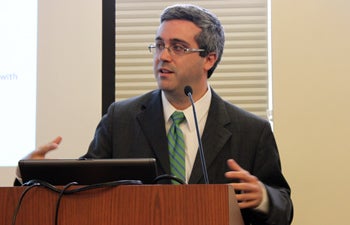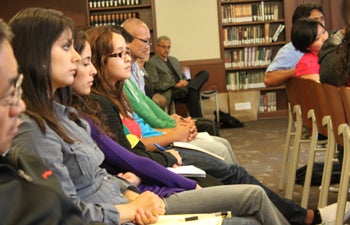Looking Beyond Arizona
We know that on July 28, 2010, Federal District Court Judge Susan Bolton blocked key sections of Arizona’s immigration law SB 1070 from taking effect.
But why did it take so long for the federal government to step up?
During a recent event at USC, panelists questioned why the U.S. Department of Justice stepped in only hours before the law would have been enacted. They wondered why the injunction focused solely on preemption — challenging the law on the grounds that the state was preempted by federal law — and failed to include the issue of racial profiling.
One reason may be that the federal government relies on racial profiling to enact its 287g and Secure Communities agreements — programs that allow local police to enforce federal immigration law. Meant to remove dangerous felons from the country, most people deported under these agreements are arrested after minor offenses such a jaywalking, they said.
“Certainly if I were in a decision-making capacity in the federal government, I might be concerned about raising legal argument against racial profiling in the course of enforcing immigration,” said panelist Tom Saenz, president and general counsel for the Mexican American Legal Defense and Educational Fund.
“Why? Because the federal government today does not significantly police or monitor local law enforcement acted under 287g and Secure Communities who engage in rampant racial profiling. So the federal government itself benefits from local law enforcement using racial profiling to enforce immigration laws.”

Civil rights attorney Tom Saenz helped lead the opposition against Arizona SB 1070. Photo credit Jacqueline Agnello.
Saenz spoke during a Center for the Study of Immigrant Integration event, Raising Arizona, which discussed Arizona SB 1070, a controversial anti-illegal immigration measure requiring certain immigrants in that state to register with the U.S. government and have their documents with them at all times. Part of the legislation expresses an “attrition through enforcement” doctrine.
Other panelists included Pablo Alvarado, executive director of the National Day Laborer Organizing Network; Niels Frenzen, clinical professor of law in USC Gould School of Law; and Tammy Bang Luu of the Labor/Community Strategy Center and Bus Riders Union headquartered in L.A.
Based in USC College, the center is directed by Manuel Pastor, professor of geography and American studies and ethnicity, and Ange-Marie Hancock, associate professor of political science.
“One of the things we’d like to do today is to start thinking about the broader ramifications of SB 1070,” said Hancock, who acted as moderator. “It’s an Arizona state law, but we do have evidence of copycat legislation and we have some struggles over how we’re going to proceed on the federal level with regard to comprehensive immigration reform.”
Alvarado said that day laborers have become the public face of immigration.
“With that comes the ugly side of it,” he said. “They’ve been targets of hatred and violence across the country. What’s happened in Arizona has happened in this country before.”

Panelists spoke to a capacity crowd at Doheny Library’s Friends of the Library Lecture Hall. Photo credit Jacqueline Agnello.
Under the Obama administration, 1,100 people are deported daily, nearly 400,000 each year; half from Arizona, Alvarado said. That is nearly 10 percent above the Bush administration’s 2008 total and 25 percent more than were deported in 2007. The rate of company audits has roughly quadrupled since President George W. Bush’s final year in office, panelists said. Although Arizona represents 2 percent of the country’s population, it produces 20 percent of federal criminal prosecutions. Of those, 85 percent are illegal immigration cases.
The “attrition through enforcement” strategy includes normalizing unjust treatment of immigrants, Alvarado said.
“They want to close every single opportunity for people to survive,” he said. “The idea is that they want to make it so miserable for migrants, they will pack their bags and essentially self deport. That’s been their logic since the beginning.”
In what he called “a ritual of humiliation,” Alvarado recalled when immigration officials marched 200 undocumented prisoners from one jail to another and invited the media, which covered the spectacle. He told the audience of another case in which two pregnant, undocumented women were arrested for minor offenses and taken to jail. They went into labor and were forced to give birth in wrist and ankle shackles.
“They are trying to normalize this treatment so that everyone in this country sees this as standard,” Alvarado said. “They use language like illegal aliens, invaders, terrorists, and it becomes in many circumstances normal.”
Frenzen said local law enforcement may pinpoint undocumented immigrants through minor violations. Police may cite someone for fishing without a license or jaywalking, but that can escalate to more serious charges.
“The reality is if you’re undocumented and you don’t have identification documents on you and you get stopped by the LAPD, normally you’ll be cited and released, but if you can’t produce identification there’s a good chance you’ll be taken into custody,” Frenzen said. “Not for the criminal prosecution of jaywalking but to ascertain your identity.
“Once you’re booked into a facility, that’s when 287g comes into play and you’re going to end up in one of the new immigration detention facilities that are rapidly expanding here in California,” he said, reminding the audience of California’s Proposition 187, a 1996 ballot measure similar to SB 1070 passed by voters then later found unconstitutional by federal court.
In the fight against copycat laws and for immigration reform, Luu said unlikely partners must band together: domestic workers, day laborers, housing rights and fight-for-living-wage advocates, among them.
“How can we galvanize the social justice community to take action not just in solidarity, but think about ways we can invest in joint struggles,” Luu said. “How can we make Arizona and the human rights of immigrants the battleground so that when it comes around to our struggle we’ve already built a relationship for which we can build a stronger movement.”
Saenz emphasized the documented widespread racial profiling happening now through 287g and Secure Communities programs.
“The federal government relies on those two programs to enforce immigration laws not just in Arizona but here in California and across the country,” Saenz said. “That’s a major threat to immigrant immigration reform, a major threat to keeping communities together and it’s a major threat to positive human relations.”